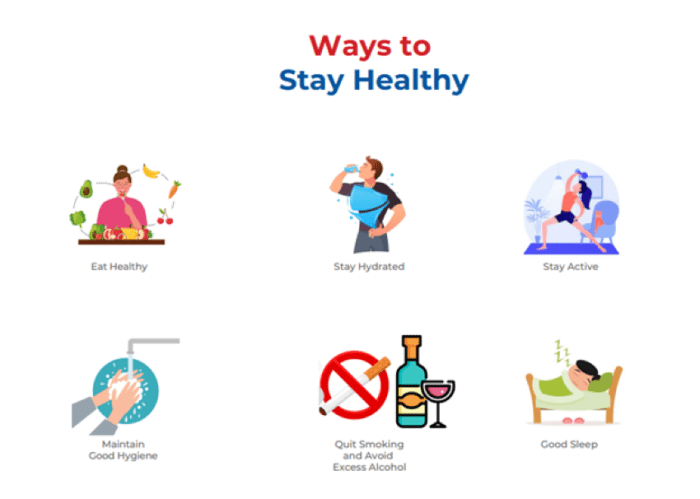Kicking off with Healthy Lifestyle Tips, this guide is all about living your best life with a hip American high school flair. From nutrition to exercise, we’ve got you covered with all the deets you need to stay on top of your health game.
Get ready to dive into the world of wellness and discover how to rock that healthy lifestyle like a boss.
Benefits of a Healthy Lifestyle
Maintaining a healthy lifestyle is crucial for overall well-being and longevity. By making conscious choices to prioritize your health, you can experience a multitude of benefits that positively impact your physical, mental, and emotional health.
Importance of Maintaining a Healthy Lifestyle
- Regular exercise and a balanced diet can help prevent chronic diseases such as heart disease, diabetes, and obesity.
- Healthy habits can boost your immune system, reducing the risk of illness and infections.
- Proper nutrition and hydration support cognitive function, improving focus and mental clarity.
Advantages of Following a Healthy Lifestyle
- Increased energy levels and improved stamina for daily activities and exercise.
- Enhanced mood and reduced stress levels, promoting mental well-being.
- Healthy skin, hair, and nails due to proper nutrients and hydration.
Impact of a Healthy Lifestyle on Overall Well-being
- Improved quality of sleep, leading to better rest and restoration of the body.
- Stronger relationships and social connections from increased confidence and positivity.
- Higher self-esteem and body image perception, fostering a positive self-image.
Correlation between a Healthy Lifestyle and Longevity
- Research shows that individuals who prioritize health tend to live longer, more fulfilling lives.
- Healthy lifestyle choices, such as not smoking and maintaining a healthy weight, are linked to increased life expectancy.
- Regular physical activity and a nutritious diet can slow down the aging process and improve overall healthspan.
Nutrition Tips for a Healthy Lifestyle: Healthy Lifestyle Tips

Eating a balanced diet is essential for maintaining a healthy lifestyle. By including a variety of nutrient-rich foods in your meals, staying hydrated, practicing portion control, and being mindful of your eating habits, you can support your overall health and well-being.
Nutrient-Rich Foods to Include in a Balanced Diet
- Leafy green vegetables like spinach and kale
- Fruits such as berries, oranges, and apples
- Whole grains like quinoa, brown rice, and oats
- Lean proteins such as chicken, fish, tofu, and legumes
- Dairy or dairy alternatives like yogurt and almond milk
Significance of Hydration in Maintaining a Healthy Lifestyle, Healthy Lifestyle Tips
Hydration plays a crucial role in supporting various bodily functions, including digestion, circulation, and temperature regulation. It is important to drink an adequate amount of water throughout the day to stay hydrated and keep your body functioning optimally.
Tips on Portion Control and Mindful Eating Habits
- Avoid distractions while eating, such as watching TV or using your phone
- Listen to your body’s hunger and fullness cues to prevent overeating
- Use smaller plates and bowls to help control portion sizes
- Eat slowly and savor each bite to better enjoy your food and recognize when you’re satisfied
Role of Vitamins and Minerals in Supporting Overall Health
Vitamins and minerals are essential nutrients that play a vital role in various bodily functions, including immune system support, energy production, and bone health. Incorporating a variety of fruits, vegetables, whole grains, and lean proteins in your diet can help ensure you are getting an adequate amount of these essential nutrients.
Physical Activity and Exercise

Regular physical activity is essential for maintaining overall health and well-being. It not only helps in managing weight but also reduces the risk of chronic diseases like heart disease, diabetes, and certain cancers. Exercise also plays a crucial role in improving mood, boosting energy levels, and promoting better sleep.
Benefits of Regular Physical Activity:
- Improves cardiovascular health by strengthening the heart and improving circulation.
- Helps in managing weight by burning calories and increasing metabolism.
- Strengthens muscles and improves flexibility, reducing the risk of injuries.
- Boosts mental health by reducing stress, anxiety, and depression.
Types of Exercises for Different Fitness Levels:
- Low Impact: Walking, swimming, and yoga are great options for beginners or individuals with joint issues.
- High Impact: Running, cycling, and aerobics are suitable for those looking for a more intense workout.
- Strength Training: Using weights or resistance bands helps in building muscle mass and increasing strength.
Tips for Creating a Sustainable Workout Routine:
- Schedule your workouts like appointments to stay consistent.
- Include a variety of exercises to target different muscle groups and prevent boredom.
- Start slow and gradually increase the intensity to avoid burnout or injuries.
- Listen to your body and rest when needed, allowing for proper recovery.
Simple Exercises to Do at Home:
- Bodyweight Squats: Stand with feet hip-width apart and lower down as if sitting back into a chair, then return to standing position.
- Plank: Hold a push-up position with arms straight, engaging core muscles to maintain a straight line from head to heels.
- Jumping Jacks: Start with feet together, then jump feet out to the sides while raising arms overhead, then return to starting position.
Mental Well-being and Stress Management
Taking care of your mental health is a crucial aspect of maintaining a healthy lifestyle. Your emotional well-being directly impacts your overall health, so it’s essential to prioritize stress management and mental wellness.
Strategies for Managing Stress Effectively
- Practice relaxation techniques such as deep breathing, meditation, or yoga.
- Engage in regular physical activity to release endorphins and reduce stress.
- Establish boundaries and learn to say no to avoid taking on too much.
- Get enough sleep to allow your body and mind to rest and recover.
- Seek support from friends, family, or a mental health professional if needed.
Tips for Promoting Emotional Well-being
- Express your feelings and emotions through journaling or talking to someone you trust.
- Practice gratitude by focusing on the positive aspects of your life.
- Engage in activities that bring you joy and fulfillment, whether it’s a hobby or spending time with loved ones.
- Set realistic goals and celebrate your achievements, no matter how small.
The Connection Between Mental Health and Overall Health
Maintaining good mental health is not just about feeling happy; it also impacts your physical health. Chronic stress and poor mental well-being can lead to a variety of health issues, including heart disease, weakened immune system, and digestive problems. By prioritizing your mental health and managing stress effectively, you can improve your overall well-being and quality of life.
Sleep Hygiene and Rest
Quality sleep is essential for maintaining a healthy lifestyle as it allows the body to rest, repair, and recharge. Poor sleep can lead to a variety of health issues, including obesity, heart disease, and impaired cognitive function.
Tips for Improving Sleep Hygiene
- Avoid caffeine and electronics before bedtime as they can interfere with sleep.
- Create a relaxing bedtime routine such as reading or taking a warm bath to signal to your body that it’s time to wind down.
- Ensure your sleep environment is conducive to rest by keeping the room cool, dark, and quiet.
Impact of Rest and Relaxation
Rest and relaxation are crucial for overall well-being as they help reduce stress levels, improve mood, and enhance cognitive function.
Strategies for Combating Insomnia
- Practice relaxation techniques such as deep breathing or meditation to calm the mind before bedtime.
- Avoid napping during the day to ensure you’re tired enough to fall asleep at night.
- Establish a consistent sleep schedule by going to bed and waking up at the same time every day.
